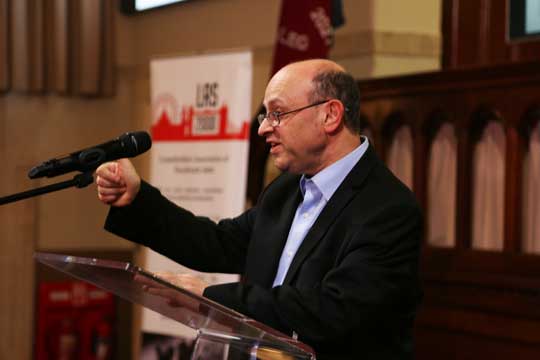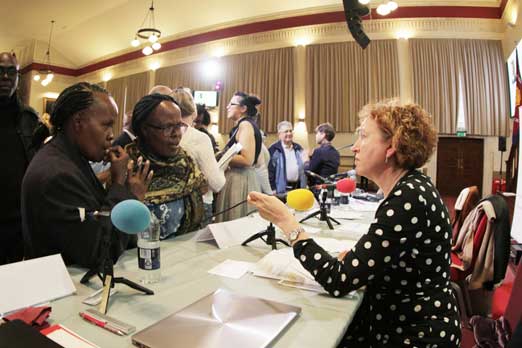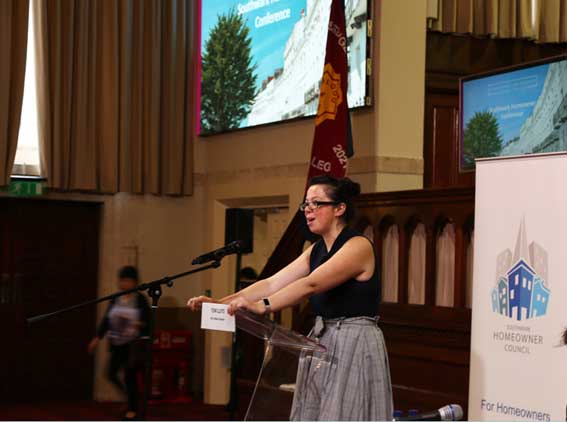
By Harry Scoffin
Perhaps the largest meeting of council leaseholders yet assembled took place last week in the London borough of Southwark.
Around 350 local authority leaseholders gathered to air numerous grievances at the Saturday event in the august setting of William Booth College, Denmark Hill, south-east London.
Organised by the grassroots Southwark Homeowner Council organisation – funded by Southwark council, for which respect – the day-long conference was chaired by LKP’s Martin Boyd.

Among the speakers were property chamber president Siobhan McGrath; solicitor Mari Knowles, who has assisted numerous leaseholders referred by LKP; former head of Southwark housing Martin Green and Nicholas Kissen, senior legal adviser at the Leasehold Advisory Service.
Councillor Kieron Williams opened the day by appearing before a sceptical audience to sell Southwark’s record on leaseholder engagement.
Councillor Williams, a council leaseholder himself, spoke sensitively about the highly charged issue of major works:
“I know that’s the thing I see most concern from leaseholders in my inbox and, clearly, that’s a stressful one for everyone. We can all be presented with large bills for major works that need to be done to our house and, I think almost everyone agrees that works need doing sometimes, but the questions that need to be asked are: Is it the right work? Is it good value for money? Is it done to a good quality and standard?”

Cllr Williams revealed that his team had gone to the effort of commissioning consultancy BritainThinks to conduct research into what the borough’s Right to Buyers make of having the council as their freehold landlord. As the polling showed that they overwhelmingly “felt like we weren’t recognising how stressful it is to receive a bill”, Cllr Williams said “we are starting again” in the relationship with leaseholders.
The promised customer service drive will focus on providing transparency around service charges and “looking how we can make sure our bills are much fuller, more detailed, easier to access, easier to access online, look at all the detail and understand why you’re being charged what you’re being charged so you can, as you absolutely should, challenge if you think things aren’t right or good value for money.”
The Labour councillor also suggested that Southwark is set to involve leaseholders in the spending decisions around major works, especially since they are “a shared spending decision” with “almost all of our blocks having tenants in too, and the tenants pay out of their rent and you pay out of your service charges.”
He added:
“And so the aim for all of us, the collective aim, is to get better value for money, for the money we’re spending on keeping these homes up to a quality that anyone would want who’s living in them, whether it’s you, your tenants, or our tenants as a council. So again there’s another major area of work we’ve got around looking at how we do major works and make sure they’re done well.”
Among the attendees was Michelle Baharier, a Southwark leaseholder who faces the loss of her home owing after disputing a £24,486 section 20 major works bill.
Martin Paine ‘is a crook who is turning sleaze in leases into an art form’, MPs told
Miss Baharier won her case in the First Tier Tribunal, but the local authority lawyered up with Phillip Rainey QC and dragged Ms Baharier to the Upper Tribunal, where she lost in December. She now faces losing her home.
Ms Baharier urged officials to recognise the toll high and opaque bills take on leaseholders’ mental health, with “people losing their homes, and even taking their lives over these issues. We have people with dementia and other issues, who are leaseholders and are being exploited.”

She also called for the council’s approach to leasehold disputes to radically change as “the council take everybody to court” yet “not one person from the council has come to talk to me.”
Ms Baharier’s sentiment found much sympathy in the room. In one of the highlights of the day, delegates voted unanimously to ask Southwark to agree to have judicial mediation on any case before going to a full tribunal hearing. LKP welcomes this development.
Attendees were also treated to a very personal reflection on leasehold matters from Martin Green, a surveyor who drew on his decades-long experience working for the council.
The former head of specialist housing services, who dealt with the borough’s Right to Buyers for years, certainly didn’t try to spin leasehold as home ownership:
“The landlord can do what he wants, when he wants, to what standard, and recharge you the costs. When you signed the lease, you signed over the right to the landlord to spend your money providing the services outlined in the lease, and that’s the basic problem.”
He said that the move away from fixed to variable service charges allowed landlords to dump all the risk on the leaseholders and that, despite numerous acts of parliament designed to make unreasonable bills challengeable,
“the underlying illness – which has not been dealt with by government – is the fact that leaseholders do not have a say and cannot influence the spending decisions to any effective extent, in most cases.”
There was a glimmer of hope for hacked-off council leaseholders, though. Mr Green spoke of the little-known right council leaseholders have over the stewardship of their homes, with the ability to form a Tenant Management Organisation (TMO) contained within 1994 regulations.
Under the rules, the council must give leaseholders an equal share of the money it would spend on providing services to the block – cleaning, grounds maintenance, day to day repairs and major works.
Mr Green spoke about his current work with Leathermarket JMB, the largest resident-led housing organisation in Southwark, which has empowered council tenants and leaseholders to come together to choose the services they want on their estates.
He said that a lifts upgrading programme he has been overseeing has overwhelming support from leaseholders, with an expensive heating replacement scheme gaining sign-off from every single leaseholder.
But running buildings is a complex business, Mr Green cautioned.
“Leaseholders need to influence the spending decisions, but don’t let anyone tell you it isn’t hard work. The amount of times I have heard people say ‘Can you be on this committee? It’s only a couple of meetings a month, or a couple of meetings a year.’ Codswallop. Absolute codswallop. If you want to be involved in the spending decisions, it’s hard work. It’s about influencing people. It’s about understanding that you have to bring as much to the table as you take away. If you speak to any of my leaseholders at Leathermarket, they will tell they have spent hours of unrestrained fun in a room with me droning on about specifications and the different design solutions that are possible.”
He said that while costs can be controlled through TMOs, using the right to manage responsibly will not lead to radically lower bills as good estate management needs to be paid for.
“The other thing that you have to remember, is that these decisions are not individual decisions. We’ve all got our own individual situation. When I’ve consulted with leaseholders before, I’ve had people saying to me ‘Please don’t do any work Martin, I haven’t got any money.’ And I’ve had other people saying, ‘Please do the work immediately, I want to sell my property.’” Effective TMO boards succeed in bringing about enlightened self-interest, Mr Green added. LKP would say that the same applies for Residents’ Management Companies and Right to Manage companies in the private sector.
Solicitor Mari Knowles urged leaseholders to keep up the pressure to achieve meaningful leasehold reform.
Miss Knowles, who advised the Law Commission for two years on its body of work on leasehold and commonhold reform, gave a potted history of leasehold law and offered some words of encouragement.
She credited the ground rent scandal for raising the consciousness of leaseholders up and down the country, whose voices created the “political motivation” to revisit landlord and tenant law.

Now working as a consultant to MHCLG, Ms Knowles suggested that it was the high levels of responses from leaseholders to government consultations that stunned both the industry and officials. This level of engagement will have to be repeated for law reform to happen, she concluded:
“If the government does launch further consultations on some of the topics that I feel quite strongly about, like Section 20 major works, like costs, the best thing you can do is speak up for yourself and tell your story.
“Unless you tell your story, and unless you explain what issues you’ve had, why you’ve had them and you respond to those, the Ministry cannot deal with it because it doesn’t know about it. So there is a certain element of, if you give that knowledge to the Ministry then they have the power to make the changes. I would really urge everybody to watch the consultations and respond.”





 Stop ‘delaying and frustrating’ post-Grenfell remediation works, government urged on BBC R4 You and Yours
Stop ‘delaying and frustrating’ post-Grenfell remediation works, government urged on BBC R4 You and Yours





















